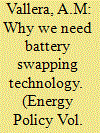|
|
|
Sort Order |
|
|
|
Items / Page
|
|
|
|
|
|
|
| Srl | Item |
| 1 |
ID:
150664


|
|
|
|
|
| Summary/Abstract |
With almost $1 billion in funding, Better Place was poised to become one of the most innovative companies in the electric mobility market. The system Better Place proposed had two novel prongs; first, to reduce the cost of batteries, and second, to reduce range anxiety, public infrastructure concerns, and long charging times. Yet, despite this seemingly strong combination, Better Place failed to make any progress in Denmark and Israel, the first two markets it operated in, and subsequently declared bankruptcy, selling off its collective assets for less than $500,000. Drawing from science and technology studies and the notion of “interpretive flexibility,” this paper posits several reasons to explain the failure of Better Place, including that Denmark is not as “green” as it seems nor is the Israeli market as attractive as believed, and that Better Place's solution to charging time and range anxiety resolved a psychological, not a functional, barrier of the general public to adopt electric vehicles. Before investigating these two reasons, the paper presents a short history of Better Place and explores the contours of its operations in Denmark and Israel. It then discusses why Better Place “failed” across both countries before concluding with implications for energy planning, policy, and analysis.
|
|
|
|
|
|
|
|
|
|
|
|
|
|
|
|
| 2 |
ID:
180156


|
|
|
|
|
| Summary/Abstract |
Energy and transport must lead the transition to a low-carbon economy, weaning their dependence on fossil fuels via massive renewable generation and electrification of transport. A major challenge is the power system imbalance between generation and demand due to the higher fraction of non-dispatchable renewable generation such as solar photovoltaic or wind. Electric mobility will lean heavily on the power system but may contribute to mitigate the imbalance problem. This work focuses precisely on the impact of different models for future road mobility in a decarbonized power system, ranking the merits of each solution. The models considered are plug-in, plug-in and catenaries, plug-in and hydrogen, and battery swapping. We show that battery swapping, the least studied model so far, is superior to the other three in all semi-quantitative criteria of merit. We conclude our analysis with implications for energy policy and examples of public policies that could boost the adoption of this model, which has huge implications both for the mobility industry and for power systems.
|
|
|
|
|
|
|
|
|
|
|
|
|
|
|
|
|
|
|
|
|